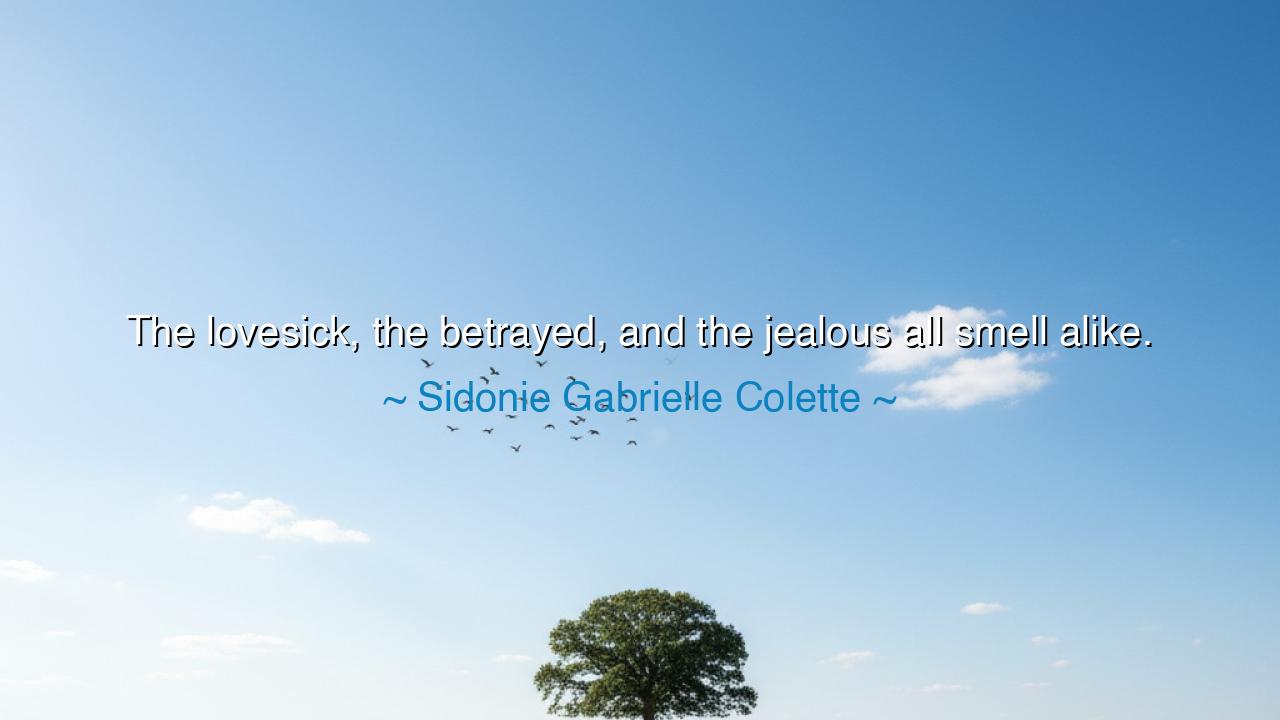
The lovesick, the betrayed, and the jealous all smell alike.






“The lovesick, the betrayed, and the jealous all smell alike.” So wrote Sidonie Gabrielle Colette, the French novelist whose pen bled with passion and truth, whose words cut deep into the human heart. In this single sentence, she captures the strange unity of those wounded by love — those who burn with longing, ache with betrayal, or seethe with jealousy. Though their stories differ, their souls carry the same fragrance — the heavy scent of suffering, of hearts scorched by the same flame. For love, when unreturned or corrupted, leaves the same mark upon the spirit. Its pain may take many shapes, but its essence is one.
In the lovesick, the heart yearns toward something it cannot possess. The world grows dim, for all light gathers around the beloved who does not see. In the betrayed, the heart that once trusted is pierced by disbelief, and the sweetness of devotion turns bitter in the mouth. And in the jealous, love twists into possession and fear — the torment of imagining loss even before it arrives. Yet though these forms appear different, they are bound by the same scent of desperation. They each arise from the same source: the heart’s refusal to let go, its insistence on clinging to what has wounded it. Thus, Colette speaks with the wisdom of one who has known love’s full spectrum — ecstasy and agony, tenderness and destruction.
Colette’s words were not born in abstraction, but in the fierce landscape of her own life. She was a woman who loved fiercely, defied convention, and suffered deeply for it. She lived in a time when women were often silenced, yet she dared to write of desire and betrayal with unflinching honesty. Her romances and heartbreaks — some public, some secret — became the soil from which her insights grew. She saw that the heart’s suffering leaves behind a kind of scent, not of the body but of the soul — something recognizable, universal, ancient. To meet someone who has loved and lost is to feel that echo within yourself, for all who have been wounded by love bear the same fragrance of longing.
The ancients, too, knew this truth. In the myths of old, Aphrodite, goddess of love, could bless or destroy with the same hand. Helen of Troy was both adored and despised, her beauty a mirror for the madness of men’s hearts. When Paris stole her, Greece and Troy burned — not for politics, but for wounded pride and jealous rage. The smell of that war — of blood and smoke and tears — was the same as Colette’s metaphorical scent: the odor of hearts undone by desire, betrayal, and jealousy. From ancient battlefields to modern hearts, the pain of love has never changed.
And yet, within Colette’s somber observation lies a hidden mercy — the knowledge that we are not alone in our suffering. When the lovesick weep, when the betrayed curse, when the jealous rage, they each walk the same road trod by countless souls before them. To smell alike, in Colette’s meaning, is to share the common humanity of heartbreak. It is to be reminded that pain, though deeply personal, is also profoundly universal. Every heart, in its breaking, speaks the same language. Every wound of love smells of salt and fire, of longing and loss.
But Colette also warns us of a deeper danger — that if we linger too long in that fragrance, we become trapped by it. To be lovesick is human; to remain so forever is a kind of death. To be betrayed is cruel; but to build walls from that pain is to imprison the soul. And to be jealous is to destroy the very love one seeks to preserve. Thus, her quote is not only a reflection, but a warning: that love’s suffering, when unhealed, consumes all who breathe it. The scent becomes poison if one does not learn to transform it — to rise from it wiser, gentler, freer.
Consider Frida Kahlo, the painter whose life was marked by passion, betrayal, and pain. Her love for Diego Rivera was both her ecstasy and her torment. She suffered his infidelities, his absence, and yet from that agony she birthed beauty. Her paintings carry the fragrance of her suffering, yes — but also the perfume of strength. She transformed jealousy and heartbreak into art, into truth. Like Colette, she showed the world that to love and suffer is not shameful — it is part of the soul’s education. But the wise must not drown in that suffering; they must learn to breathe through it until it becomes creation.
So, my listeners, take this lesson from Sidonie Gabrielle Colette: if you find yourself lovesick, betrayed, or jealous, know that your pain is ancient, and that its scent lingers on all who have ever loved. Do not deny it, but do not worship it either. Feel it fully, then release it. Let your heart breathe again, that it may carry not the odor of sorrow, but the fragrance of understanding. For to love is to risk pain, and to heal from pain is to grow into wisdom. And when you rise from that ache, you will find that love, in its purest form, no longer binds or burns — it frees.
Thus, remember Colette’s immortal truth: though the lovesick, the betrayed, and the jealous may smell alike in their suffering, the wise learn to cleanse that sorrow with forgiveness, and to carry instead the sweet, unbroken scent of peace.






AAdministratorAdministrator
Welcome, honored guests. Please leave a comment, we will respond soon